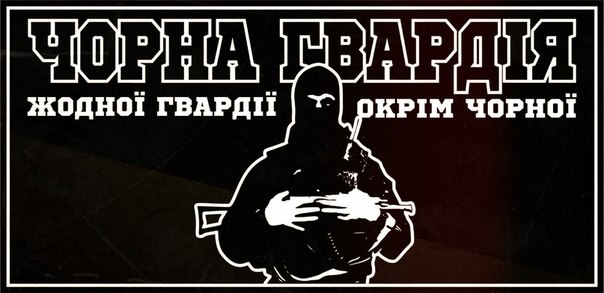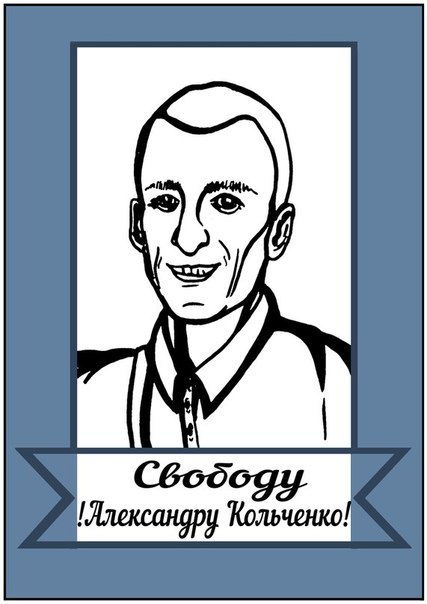INFO: Black Guards are social-revolutionaries who are fighting in the East against the Russian imperialists.
Since the information in the media is perverted and exhibited with the position, which is suitable for the authorities, we decided to ask our friends in the East Ukrainian frontline a few questions. We are beginning to conduct a heading “Dialogue with the Black Guardsmen,” where our fighting friends will answer our questions.
1) What is the mood of the civilians in the Eastern Ukraine?
The majority of people have about the same attitude to what is going on– they do not care who is in power, the main thing which they want – peace and no war. Virtually no one is willing to change their lives. If the majority of the people of Ukraine saw the power of self-organization Maidan and implements it successfully, here (in the East) all people are waiting for the good king, who will not f…ck their brain and will make life nice for them. In general – want to live an easy life without any efforts.
2) How many people in the percentage you have in the battalion from the East, and what is the number of the whole battalion?
In our battalion we have almost 65-70% people from the Donbass region. People of different social and age groups. In general staff includes 550 people. With a reserve we have a little more.
3) Did you talk to so-called separatists? What is your impression?
Yes, when I managed to participate in the questioning of militants. Some of them actually believe in independent DNR / LNR and fight for the idea and good money (even compared with Kiev salaries). Others just for the money. Others because of fear. Among separatists and their commanders the tactic of taking families as hostages is widespread. This is why the third category is the most resistant in the fighting. Of course there are also Russian mercenaries and professional raiding GRU groups. Their reasons are unknown to me.
4) What will happen when people come home from the ATO? Do you think these people will solve the problems with our government and will the Maidan continue?
I do not know where or how, but the guys in our battalion have decided to go up to the end. Once the ATO will come to an end, we’re going to Kiev and will ask very serious questions those in charge of the situation. I am sure that the revolution continues and the guys, who smelled gunpowder, will return home and a new round will start. Those bastards will answer for those killed during the Maidan and for bad body armor and for the Crimea, which was stupidly passed to invaders.
5) How do you evaluate your preparation before the war, and what do you think about the war shoulder to shoulder with untrained people?
Preparation of soldeirs is really very weak and superficial. What can you teach for a month? But a lot of things are still remembered and useful. We were given a lot of theory and now this theory is growing into practical experience. It turns out good symbiosis that helps you to survive in the battle. Those who have poor training and/or a little practice, certainly do not feel very confident. There are fear and insecurity, but our more experienced friends always try to prompt and teach others, because you never know who will watch your back in the fight.
6) What were your feelings in the first fight?
In the first fight I was constantly trying to remember what I was taught (how to move, how to shoot, etc.). Though when the fight began I realized that I forgot almost everything. Moreover there was much of adrenaline and a great desire to win.
7) Did you get into critical situations in the battle, and what did you think at that moment?
The situations were different, but one particularly is memorable. A sniper started to shoot in our group, and with the other two sides mortars fired. There was no fear. The only thought – how to get around a sniper and try to finda gun-layer. At some point in time the realization of the war as «the war» disappeared and only the work that needs to be done left. Only after battle you start to imagine what it would be if I was killed or wounded? You analyze errors and memorable conclusions. Actually, there is not so much difference between the fight against separatists with AK-47 and fight foryour favoirite football tem «Arsenal Kiev».
8) How were you influenced by the death of comrade in arms (if it was) in a battle where you have been together?
There were no deaths in one battle, but a couple of days ago near Donetsk my friend was killed. We were living in the same tent during our training courses… It is really bad feeling. You feel wild rage and desire to send to the Hell as much as possible enemies. For this man.
9) What would like to wish the guys who are fighting now?
I wish the commarades who are fighting against Russian imperialists – less injuries, more victories and have smart commanders.
Take care of yourself! We still have to build a new country!
(BHS)
Info: Crna Garda su socijal-revolucionari koji se bore na Istoku protiv ruskih imperijalista
Budući da je mnogo informacija u medijima koje idu na ruku ovoj ili onoj vlasti, odlučili smo pitati naše druge sa Istoka nekoliko pitanja. Započinjemo rubriku “Dijalog sa Crnom Gardom”, pitanja na koja će naši drugovi odgovarati. (via Arsenal Kijev)
1. Kakvo je raspoloženje civila na Istoku Ukrajine?
Većina civila je raspoložena poprilično jednako – ne zanima ih ko je na vlasti, glavna stvar im je: mir bez rata. Praktički niko nije spreman da mijenja svoj život. Ako je većina naroda u Ukrajini vidjela moć samoorganizacije i uspješnost njene sprovedbe, ovdje svi čekaju ‘dobrog cara’ kojem neće bit sjeban mozak i koji će sve divno raditi za njih, tj. oni prosto žele živjeti lijepo bez ikakvog truda.
2. Koliko % ljudi u tvom bataljon dolazi sa Istoka, i kakva je cjelovitost bataljona?
U našem bataljonu je 65-70% ljudi iz Donbasa. Ljudi raznih socijalnih i dobnih grupa. Ukupno nas ima 550.
3. Jesi li imao priliku da pričaš sa tzv. separatistima? Kakav je ukupni dojam?
Imao sam priliku razgovarati sa vojnim zatvorenicima. Neki od njih zapravo vjeruju u nezavisnost DNR/LNR i da se bore za dobru ideju, i dobar novac (upoređen s kijevskim platama), drugi samo za novac, treći iz straha. Izgleda da je treća strana najotpornija u borbama – i naravno, tu su ruski plaćenici i diverzione grupe GRU. Kakvi su njihovi motivi, ne znam.
4. Šta će se desiti kada se ljudi iz ATO vrate kući? Misliš li da će se rješavati probleme sa našom vladom i produžiti Majdan?
Ne znam, gdje i kako, ali momci iz našeg bataljona odlučili ići do kraja. Kad se ATO završi ili približi kraju, mi ćemo otići u Kijev tražiti odgovore na pitanja. Uvjeren sam da se revolucija nastavlja i momci koji su mirisali barut će otići kući i nova runda će početi. Ti gadovi će nam morati odgovarati za sve ubijene tokom Majdana i za lošu opremu u vojsci, za Krim, koji su glupavo dali okupatorima.
5. Kako ocjenjuješ svoje pripreme do rata, šta misliš o ratu sa neutreniranim ljudima?
Pripreme su slabe i površne, naravno. Imamo samo mjesec dana za obuku, ali postoji mnogo stvari koje se trebaju naučiti. Dali su nam mnogo teorije i sada ta teorija postaje praktično iskustvo. Oni koji su imali loše treninge i malo prakse, naravno, ne osjećaju se lijepo u vatri. Prevladava strah i nesigurnost, ali ih pokušavamo potaknuti, naučiti, jer nikada ne znaš ko će ti čuvati leđa.
6. Kako si se osjećao u prvoj borbi?
U prvoj borbi sam se stalno pokušavao sjetiti onoga što sam naučio – kako se pravilno kretati, kako pucati itd. Načisto sam sve zaboravi. I to je bilo pitanje adrenalina i velike želje za pobjedom.
7. U kritičnim situacijama u borbi, kakve su misli u tom momentu?
Situacije su razne, jedna mi je posebno ostala u sjećanju. Na našu grupu je počeo pucati snajperista, a sa druge dvije strane minobacači. Straha nije bilo. Jedinstvene misli – kako dobiti snajperistu ili pronaći minobacače. U nekom trenutku sam shvatio da je rat, i kao takav – onemogućuje ti da misliš šta bi trebao da radiš, već prosto radiš. Kasnije sam počeo razmišljati da nema velike razlike između borbe sa kalašnjikovim u rukama i tuče zbog Arsenala.
8. Kako utiče na tebe smrt drugova sa kojima si se zajedno borio?
Još nije bilo smrti u našim borbama, ali je prije par dana je poginuo drug u Donjecku. Težak osjećaj. Divlja strast i želja za njime nam daje više snage.
9. Šta bi poručio momcima koji se bore sada?
Želim im manje ozljeda, više pobjede. Pazite se … još moramo izgraditi novu zemlju!


